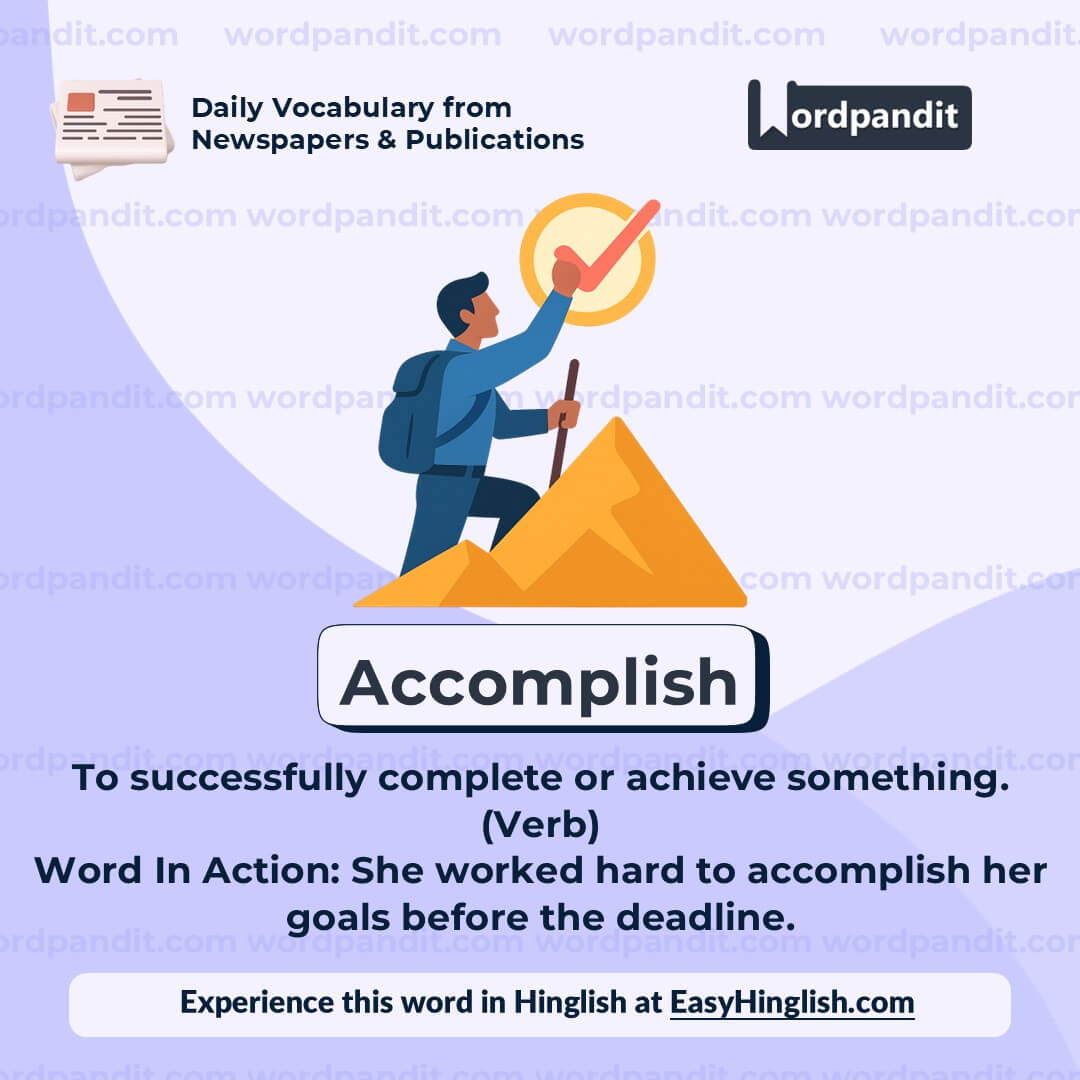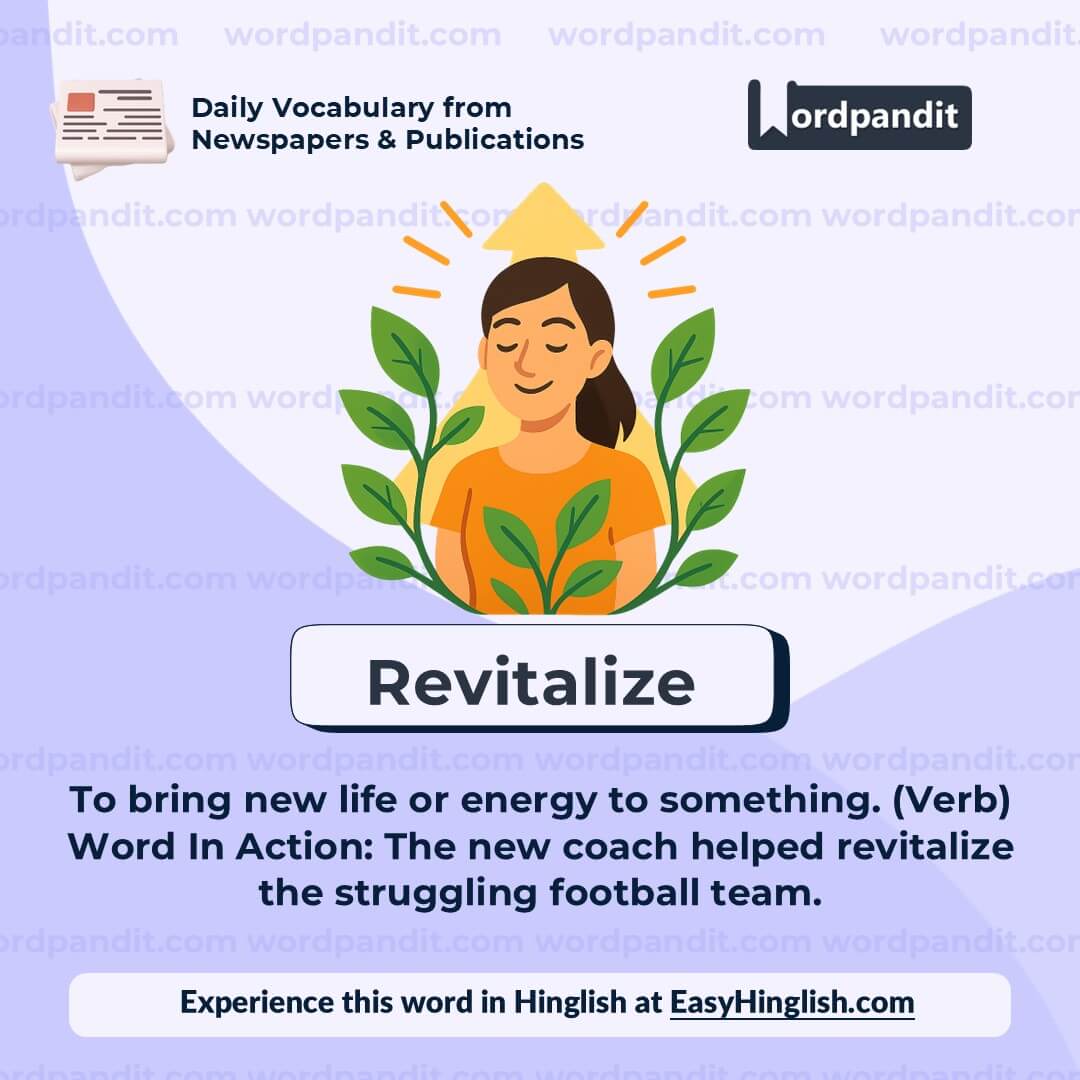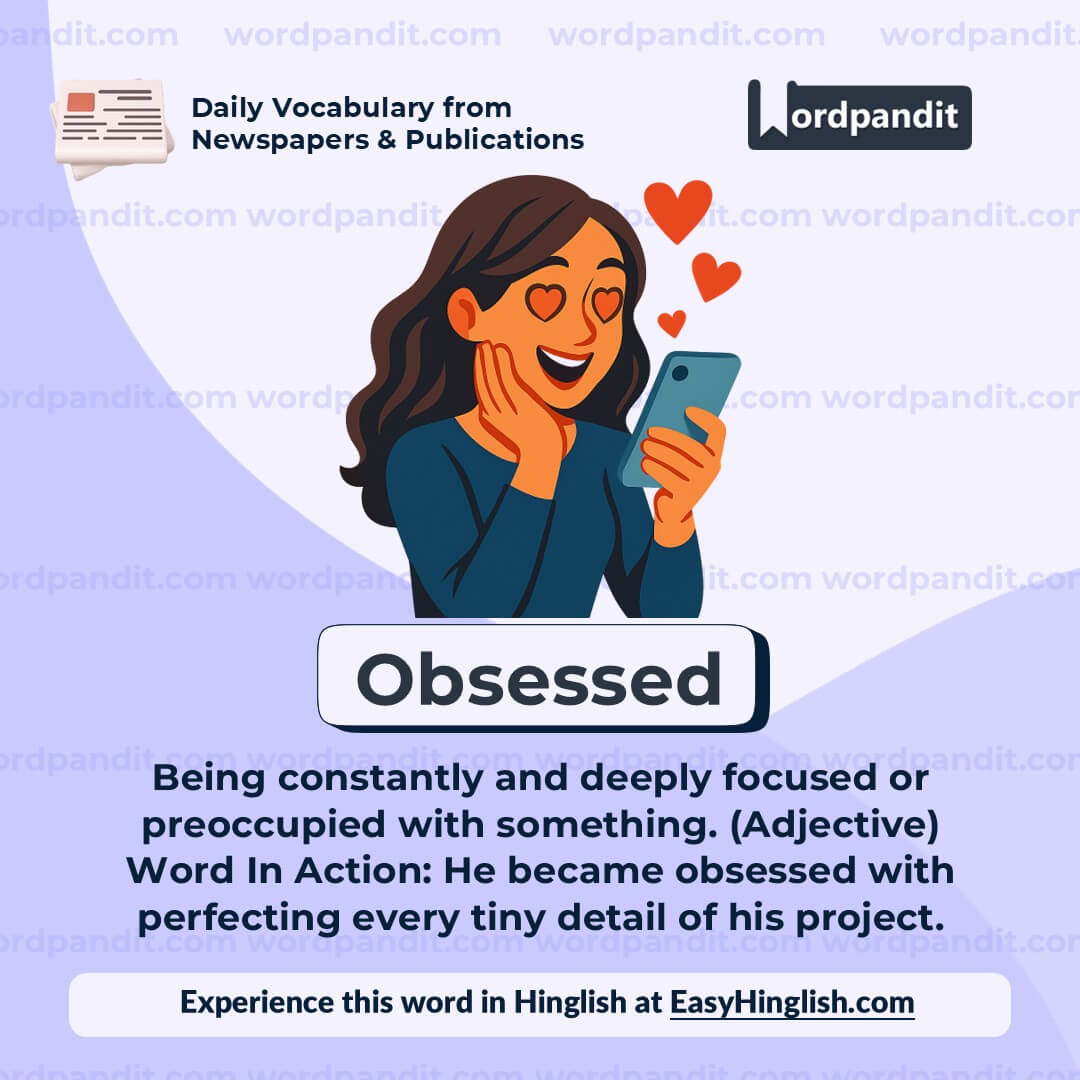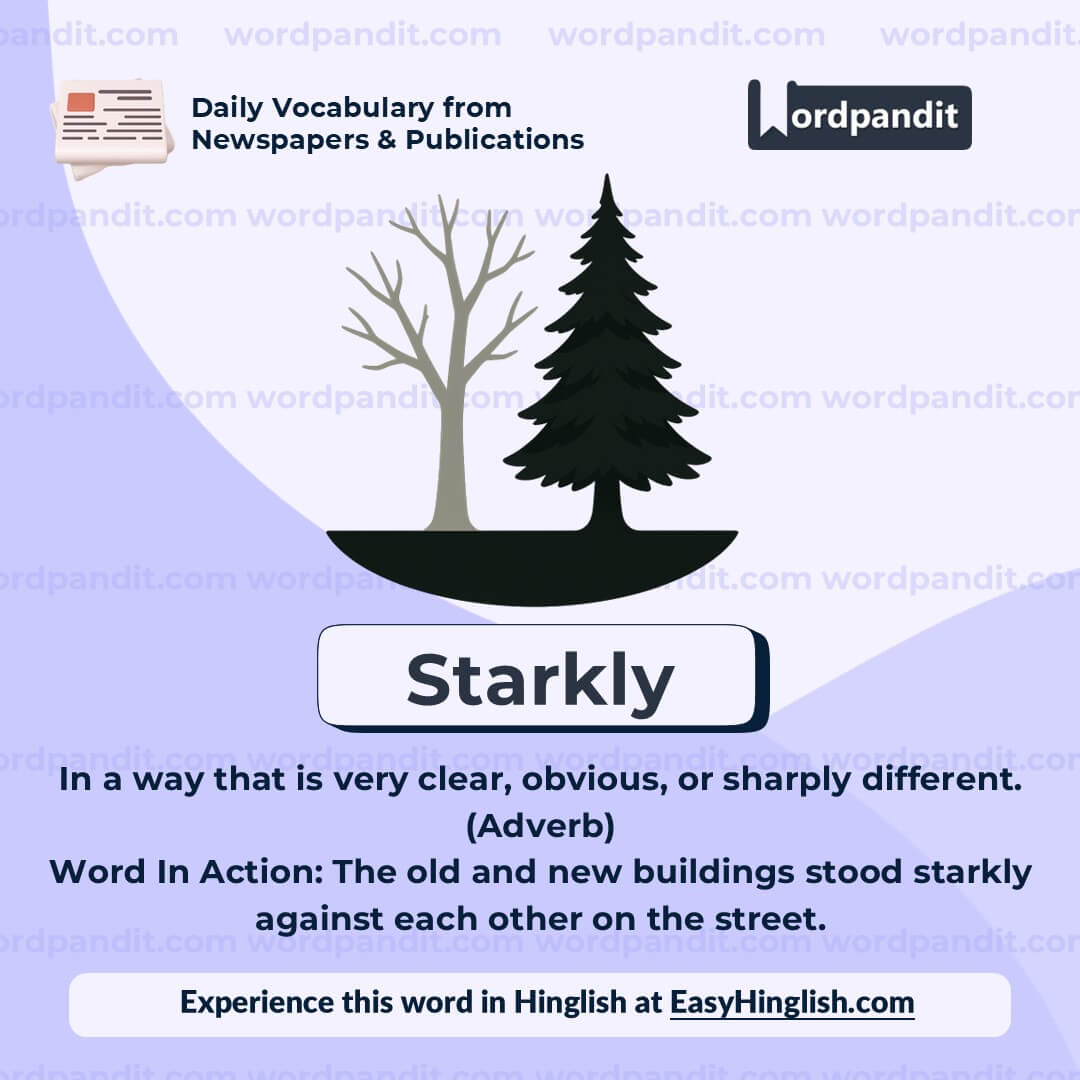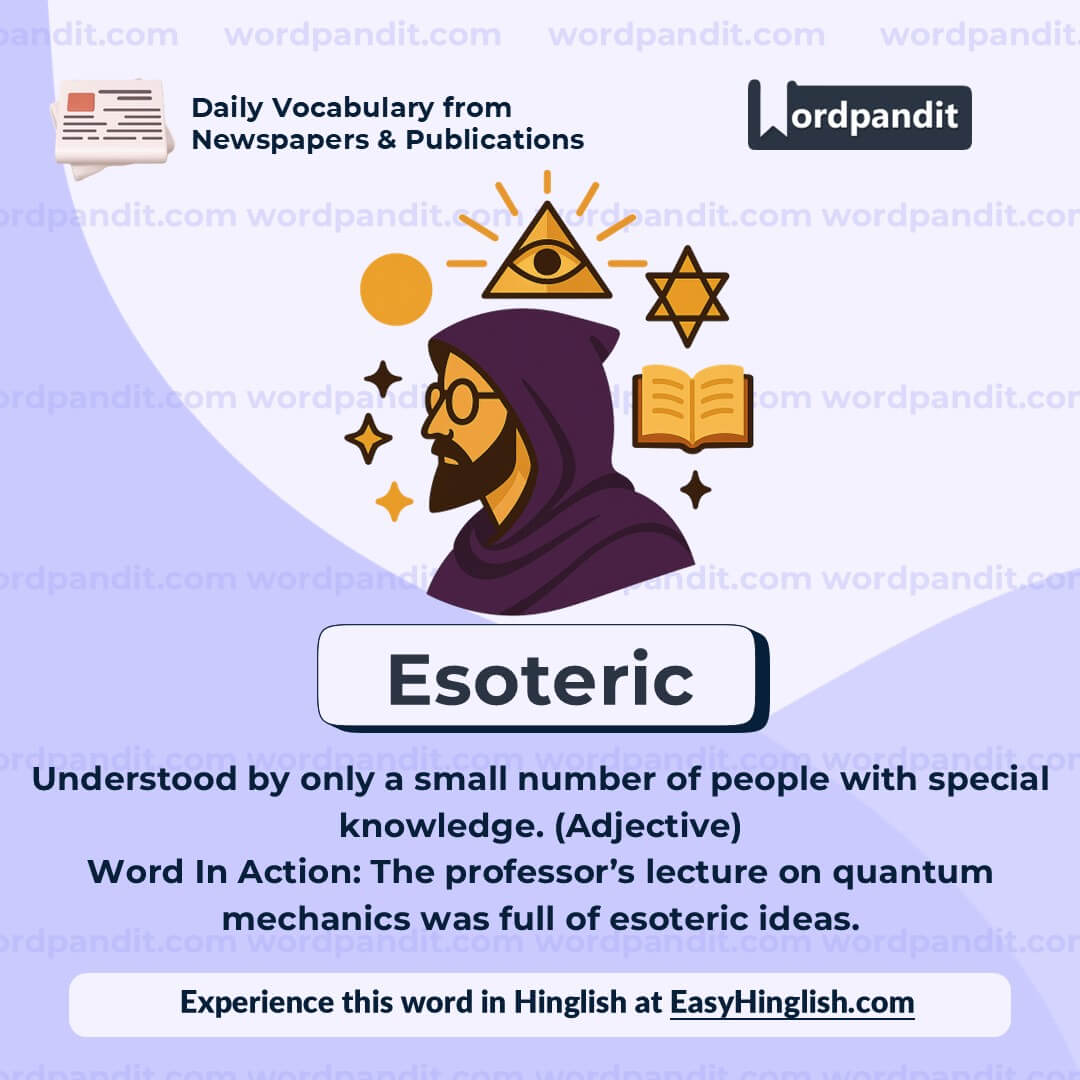Daily Vocabulary from International Newspapers and Publications
Expand Your Vocabulary with Wordpandit’s Global Vocabulary Hub
At Wordpandit, we are committed to helping you develop a truly global vocabulary by drawing from some of the most respected international publications. This section is designed to keep you ahead of the curve by introducing you to words that define global conversations and trends.
The Power of Global Sources
To help you think and communicate on a global scale, we curate vocabulary from renowned international sources, such as:
- The New York Times
- The Washington Post
- BBC
- The Guardian
- The Economist
- Scientific American
- Psychology Today
- And many more...
Stay Global, Stay Competitive
Our daily updates from international publications ensure you are consistently exposed to new words that reflect global news and developments, making sure your vocabulary is not only current but also globally relevant.
Enhance Your Global Perspective
Whether you’re preparing for international exams, aiming to excel in global business communication, or want to enhance your language skills for personal growth, Wordpandit offers the resources you need to thrive in a global context.
Effective Learning, Global Reach
Our learning methodology combines global examples, memory aids, and interactive activities, allowing you to internalize new words effectively and apply them in real-world scenarios.
Begin Your Global Vocabulary Journey Now!
Why Choose Wordpandit?
Practical Learning: Focus on words you'll actually encounter in real-world reading, enhancing your comprehension and communication skills.
Diverse Content: From current affairs to scientific breakthroughs, our varied sources expose you to vocabulary across multiple domains.
Effortless Integration: Make Wordpandit a part of your daily routine. Just a few minutes each day can significantly boost your lexicon over time.
Your Path to Vocabulary Mastery
- Visit our Daily Vocabulary section regularly
- Explore new words and their usage in context
- Practice incorporating these words into your own writing and speech
- Track your progress as your vocabulary expands
Start Your Journey Today
Embark on your vocabulary enhancement journey with Wordpandit. By consistently engaging with our daily posts, you'll build a robust vocabulary that serves you well in academic, professional, and personal contexts.
Remember, a word a day keeps linguistic limitations at bay. Make Wordpandit your daily companion in the quest for vocabulary excellence!
WORD-1: Accomplish
Context:
"There are two related theories of what Donald Trump’s dramatic revision of the global trade system is intended to accomplish. First, the goal is to revitalize American manufacturing, our capacity to build at home and export to the world." - The New York Times
Explanatory Paragraph:
The word “accomplish” refers to successfully completing a task, goal, or objective, especially one that requires effort or skill. In the context of policies or actions, it implies achieving the desired result. When someone accomplishes something, it means they have turned a plan into reality through dedication, planning, and execution.
Meaning: To achieve or complete successfully (verb)
Pronunciation: uh-KOM-plish
Difficulty Level: ⭐⭐ Beginner
Etymology: From Old French ‘accomplir’, meaning to fulfill or complete, derived from Latin ‘ad-’ (to) + ‘complēre’ (to fill up).
Prashant Sir's Notes:
This is a simple but powerful verb that can be used across contexts — personal, academic, professional, or political. Focus on its connection to achieving a result, especially after sustained effort.
Synonyms & Antonyms:
Synonyms: achieve, fulfill, attain, carry out, complete
Antonyms: fail, abandon, neglect, fall short
Usage Examples:
- She worked hard to accomplish her dream of becoming a doctor.
- The project was accomplished ahead of schedule due to excellent teamwork.
- What do you hope to accomplish with this new initiative?
- Despite many setbacks, they finally accomplished their mission.
Cultural Reference:
"It is amazing what you can accomplish if you do not care who gets the credit." – Harry S. Truman
Think About It:
Is accomplishment more about the end result or the journey taken to reach it?
Quick Activity:
List three goals you’d like to accomplish this year. Write one sentence for each on how you plan to achieve them.
Memory Tip:
Think of "accomplish" as “complete + polish” — finishing something and doing it well!
Real-World Application:
“Accomplish” is commonly used in professional settings to describe completed tasks or objectives, especially on resumes, performance reviews, and strategic plans.
WORD-2: Revitalize
Context:
"There are two related theories of what Donald Trump’s dramatic revision of the global trade system is intended to accomplish. First, the goal is to revitalize American manufacturing, our capacity to build at home and export to the world." - The New York Times
Explanatory Paragraph:
“Revitalize” means to bring new life, energy, or strength to something that has become weak, inactive, or outdated. It's often used in the context of economies, industries, neighborhoods, or organizations that have declined over time. To revitalize something is to inject it with renewed purpose, productivity, or enthusiasm. In the context of the sentence, the goal is to breathe new life into American manufacturing and restore its previous strength.
Meaning: To give new life or energy to something; to restore strength or vitality (verb)
Pronunciation: ree-VY-tuh-lyz
Difficulty Level: ⭐⭐⭐ Intermediate
Etymology: From Latin ‘re-’ (again) + ‘vita’ (life) + ‘-ize’ (verb-forming suffix); literally “to bring back to life.”
Prashant Sir's Notes:
Think of this word in transformation terms — when something dull or dying gets its spark back. Useful in business, government, health, and even emotional contexts. A powerful word with a hopeful tone.
Synonyms & Antonyms:
Synonyms: rejuvenate, renew, regenerate, refresh, revive
Antonyms: weaken, exhaust, drain, deteriorate, decline
Usage Examples:
- The new leadership hopes to revitalize the company by investing in innovation.
- A major renovation project helped revitalize the once-neglected downtown area.
- Yoga and meditation have helped revitalize her energy and focus.
- The government launched a plan to revitalize rural economies through infrastructure projects.
Cultural Reference:
"Urban revitalization projects across the world—from New York’s High Line to Seoul’s Cheonggyecheon Stream—demonstrate the power of bringing dead spaces back to life." - Urban Studies Journal
Think About It:
What areas of your life or community could benefit from revitalization, and what would that transformation look like?
Quick Activity:
Write down three things (a place, a habit, or a system) you would like to revitalize and how you would go about doing it.
Memory Tip:
Break it down: “re” (again) + “vital” (life) → to bring life again. Imagine CPR for something non-living!
Real-World Application:
“Revitalize” is commonly used in government, business, and healthcare to describe reforms or actions intended to bring back growth, energy, or productivity. It's also frequent in media when discussing community or economic development.
WORD-3: Obsessed
Context:
"We know that Trump has always been obsessed with starkly simple numbers. Network TV ratings. The overall trade balance in goods (not services)." - The Guardian
Explanatory Paragraph:
“Obsessed” describes a state of mind where someone is constantly preoccupied with a particular thought, idea, person, or object. It usually suggests an unhealthy or excessive focus that dominates one’s attention. In the context above, the word implies that Trump gives extreme importance to numbers—like ratings and trade balances—often beyond what may seem reasonable or balanced.
Meaning: To be constantly and excessively preoccupied with something (adjective/verb - past participle)
Pronunciation: uhb-SESST
Difficulty Level: ⭐⭐ Beginner
Etymology: From Latin ‘obsessus’, meaning "besieged", from 'obsidere' (to besiege or occupy).
Prashant Sir's Notes:
Be careful with this word—it carries emotional weight. It can express deep passion or intense fixation, but it also has a slightly negative edge when it implies losing objectivity or balance. Very useful in character descriptions and psychological contexts.
Synonyms & Antonyms:
Synonyms: fixated, preoccupied, infatuated, addicted, consumed
Antonyms: indifferent, uninterested, detached, dispassionate
Usage Examples:
- He's obsessed with fitness and never misses a day at the gym.
- She became obsessed with solving the mystery and stayed up all night researching.
- Teenagers can easily get obsessed with social media trends.
- Don't be obsessed with perfection—sometimes good enough is good enough.
Cultural Reference:
"Sherlock Holmes is often portrayed as being obsessed with solving cases, to the point of neglecting his own health or relationships." – Literary analyses of Arthur Conan Doyle's work
Think About It:
Where is the line between being passionate and being obsessed? How can you tell when you've crossed it?
Quick Activity:
Write down one thing you’re currently “obsessed” with (positive or negative). Now reflect: is it helping or hindering you?
Memory Tip:
Think of “obsessed” as being mentally “possessed”—something takes over your mind completely.
Real-World Application:
“Obsessed” is frequently used in media, marketing, and pop culture to describe strong emotional attachment—e.g., “obsessed with this new app,” or “fans obsessed with the latest season.” It's also relevant in psychology for describing compulsive thought patterns.
WORD-4: Starkly
Context:
"We know that Trump has always been obsessed with starkly simple numbers. Network TV ratings. The overall trade balance in goods (not services)." - The Guardian
Explanatory Paragraph:
“Starkly” is an adverb used to describe something in a way that is very clear, plain, or sharply distinct—often in a harsh or dramatic manner. In the sentence above, it highlights how simple and bold the numbers are, almost to the point of being stripped of nuance. When something is described starkly, there's no attempt to soften or sugarcoat it—it is presented in raw, unmistakable terms.
Meaning: In a way that is sharply clear, obvious, or dramatically simple (adverb)
Pronunciation: STAHRK-lee
Difficulty Level: ⭐⭐⭐ Intermediate
Etymology: From Old English ‘stearc’ meaning “stiff, severe, strong,” combined with the adverbial suffix ‘-ly’.
Prashant Sir's Notes:
This word often signals contrast or severity. Pay attention to how it adds a sense of seriousness, simplicity, or even brutality to a description. It’s useful in writing where you want to emphasize sharp differences or realities.
Synonyms & Antonyms:
Synonyms: bluntly, plainly, clearly, harshly, severely
Antonyms: subtly, gently, softly, vaguely, delicately
Usage Examples:
- The report starkly revealed the failures of the healthcare system.
- Her emotions were starkly visible on her face after hearing the news.
- The documentary starkly contrasts wealth and poverty in urban areas.
- The landscape was starkly beautiful—vast, empty, and haunting.
Cultural Reference:
"In black-and-white photography, images are often starkly dramatic, emphasizing contrast and emotion without the distraction of color." – National Geographic
Think About It:
Why do you think we sometimes prefer starkly simple explanations over complex ones, even if they miss important details?
Quick Activity:
Take a sentence describing a soft or subtle situation and rewrite it in a “starkly” dramatic way. Notice the shift in tone.
Memory Tip:
Think of “Stark Industries” from Iron Man—sharp, bold, no-nonsense. “Starkly” brings that same bold, bare style to descriptions.
Real-World Application:
“Starkly” is often used in journalism, essays, and critical writing to highlight strong contrasts or highlight raw truths—especially in topics like politics, inequality, or crisis reporting.
WORD-5: Esoteric
Context:
"I have DJed at some impressively esoteric weddings in my time. I started playing clubs in 1999, but in the mid-2000s I started advertising myself as a wedding DJ on the era-defining digital noticeboard Gumtree." - The Guardian
Explanatory Paragraph:
“Esoteric” refers to something that is intended for or likely to be understood by only a small, specific group of people with specialized knowledge or interests. It often implies exclusivity or obscurity. In the sentence above, it means the weddings were unique or had themes, music, or traditions that were unusual, niche, or unconventional—appreciated mainly by those with particular tastes or cultural backgrounds.
Meaning: Understood by or meant for only a small number of people with special knowledge (adjective)
Pronunciation: es-uh-TAIR-ik
Difficulty Level: ⭐⭐⭐⭐ Advanced
Etymology: From Greek ‘esōterikos’, meaning “belonging to an inner circle,” derived from ‘esō’ meaning “within.”
Prashant Sir's Notes:
Use “esoteric” when something feels like an inside joke, reference, or concept—one that only a niche group understands. Great for describing music, art, theories, or communities that are not mainstream. It’s a classy word for “not for everyone.”
Synonyms & Antonyms:
Synonyms: obscure, arcane, cryptic, abstract, enigmatic
Antonyms: common, mainstream, accessible, popular, well-known
Usage Examples:
- The professor’s lecture on quantum theory was so esoteric that only a few students could follow it.
- He has an esoteric taste in music—mostly 1970s Japanese jazz fusion.
- That book is full of esoteric references that only classic literature majors would get.
- The designer’s style is considered esoteric by many, but loved by fashion insiders.
Cultural Reference:
"The appeal of Wes Anderson’s films lies partly in their esoteric visual style and eccentric characters—deeply appreciated by a loyal niche audience." – IndieWire
Think About It:
Is it better for ideas and art to be widely accessible, or to remain esoteric and exclusive to a passionate few?
Quick Activity:
List three interests or hobbies you have that others might consider esoteric. Why do you enjoy them?
Memory Tip:
Think: “Esoteric = Extra-Specific Topic.” It’s for those on the inside track of knowledge or interest.
Real-World Application:
“Esoteric” is often used in academia, art, and subcultures to describe things that are intellectually or culturally deep, but not widely understood. It helps describe niche trends, advanced theories, or insider knowledge.



